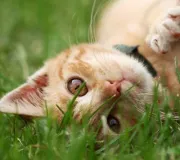You want to feed your favorite feline a nutritious diet. You may have consulted your veterinarian for recommendations on which food to give your cat. But, once you’ve purchased a good-sized bag of kibbles which should provide tasty meals for several weeks, how best to keep it? Proper food storage practices can influence the food’s freshness and ability to maintain its optimum nutritional profile. Read on for the do’s and don’ts of cat food storage!
Keep Food in the Original Bag
Cat food manufacturers package kibbles in heavy-duty bags. This sturdy packaging helps to keep the food fresh, and the bags generally won’t tear with normal home use. Also, keeping the bag means you can access the food’s barcode, expiration date, and batch code. This data can prove valuable if you receive notice of a product recall, or must return the food for another reason.
Keep the Food Bag Sealed
After you scoop your cat’s food from the bag, immediately seal it to prevent unnecessary air and humidity from reaching the kibbles. Both factors help the cat food degrade faster and make bacterial contamination more likely.
Proper food storage is just one aspect of ensuring your cat’s well-being. If your feline friend is keeping you up at night with their active behavior, it can be frustrating for both you and your pet. Check out our article ‘How to Stop Your Cat From Keeping You Up at Night‘ for tips on promoting a healthy sleep schedule for your cat and yourself.
Store the Bag Away From Sunlight
Sunlight exposure can thwart your efforts to keep dry food fresh. If the cat food bag sits in the sun, the bag’s interior temperature and humidity will increase. These conditions cause the food to degrade faster. Even worse, warm and humid conditions raise the risk of contamination by Salmonella and other dangerous bacteria.
Throw Away All Expired Food
Perhaps you’re tempted to use food that has passed the “best by” or “use by” dates. The manufacturer has provided those dates to keep the food fresh – and safe – for your favorite feline companion. Don’t risk your kitty’s health by feeding her expired food. Toss those past-their-prime kibbles immediately – and scoop her next meal from a new bag of crunchies.
In the same vein, don’t dump “bottom of the bag” kibbles on top of just-opened new food. If the “old” food has begun to spoil, or is otherwise contaminated, you’ll impact the new bag.
To continue providing your cat with excellent nutrition, contact your veterinarian in St. Lucie County, FL for expert advice. Our Vet Nutrition and Weight Management service can help you create a personalized feeding plan that meets your cat’s specific needs and helps them maintain a healthy weight.

